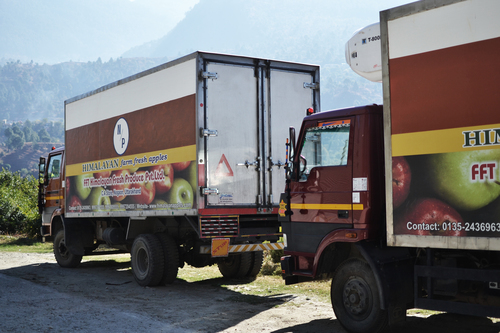How do you enter the Indian market as a Dutch producer of high-quality, expensive technology? Fresh Food Technology from Tiel successfully exports to India after starting an innovative, social project.
Over 40 per cent of all fruit and vegetables in India are lost before they reach the market. The reason: the chain from farmer to consumer is badly organised and lacks good infrastructure. The Indian apple chain is exemplary. Apples are grown at high altitudes in the inhospitable Himalayas. The farmers carry their apples from the orchard to the paved road with donkeys or in big bags on their backs. To sell them, they are at the mercy of middlemen with strangling contracts. Packaging is poor, roads are a series of potholes, there is no refrigerated transport and normal cold storage is almost non-existent.
Van Amerongen, a multinational company from Tiel specialised in the storage of fruit and vegetables, wanted to offer a solution for this problem as part of its CSR policy. Via its sister company Fresh Food Technology, the company set to work in the Indian state of Uttarakhand, together with a local partner, an NGO. "We took a very business-like approach to the project from the start," explains Fresh Food Technology's Edwin Willemsen. "Our local partner mobilised four cooperatives of apple farmers. These cooperatives became co-owners of a joint venture run by the Indian NGO, the farmers and ourselves. Then we set up four collection points where farmers can sell their apples to the joint venture immediately after harvest. There, the apples are sorted, pre-cooled and packed properly and the quality monitored. The prices for the apples are set together with the farmers. If the joint venture makes a profit, the farmers also receive a premium on the apples they have sold.
Once that process was in place, Fresh Food Technology built a state-of-the-art cold storage facility in the middle of the Himalayas, with financial support from the Dutch Het Groene Woudt Foundation. Willemsen: "The farmers are trained to pick the apples at the optimum stage of ripening. We can then get the apples into the cold store within 24 hours, where they can be stored for up to 11 months. This means that we can sell the apples as soon as the normal cold stores in India are empty and the prices are much higher. Part of the surplus proceeds go to the farmers, while the rest is invested in the business and in paying off the investment, so that we can also help other farmers in India."
As good as the business model sounds on paper, it also appears to work in practice. The number of affiliated farmers has increased from 500 in 2007 to about 4,000 in 2014. Currently, no less than 1.2 million kilos of apples are stored in the cold store. Because of their good quality, these are now part of the premium segment in India. The apples are no longer sold through middlemen, but directly to large Indian retailers who are happy to pay a premium price. "We now receive direct calls from leading supermarket chains asking us to please supply them with apples," says Willemsen.
Financially it is very interesting for all parties: the farmers' income has increased by about 30%, the first part of the loan has already been repaid and the project in Uttarakhand has turned out to be a perfect showcase for Fresh Food Technology. Willemsen: "Fruit and vegetable traders regularly come to see how we have handled things in Uttarakhand. Because we have built according to European standards, the project is known in India as "Little Holland". Indian investors see how important it is to build of good quality and to invest in reliable installations. As a result, we have already built more than 100 cold stores for commercial parties across India this year."

